Introduction
PLEASE NOTE: Daytryp Health does not currently offer Psilocybin Therapy at our facility. We hope to offer this life-changing treatment as the law allows in 2024. This guide is designed to be an educational and useful tool for those embarking on a psilocybin microdosing journey. Daytryp Health supports the careful and intentional use of psilocybin, psychedelics and all plant medicines when used in a ceremonial and sacred way. Always speak to your primary care physician before you start your journey into the world of psychedelic medicines.
Psilocybin microdosing is an innovative and transformative approach to enhancing mental health, unleashing creativity, and boosting overall well-being. By consuming small, sub-perceptual doses of psychedelic mushrooms, countless individuals have found relief from a broad range of mental health conditions such as treatment-resistant depression, anxiety, PTSD, and even neurodegenerative conditions like Alzheimer’s and Parkinson’s disease.
Recent studies have shown that psilocybin may have potential benefits for helping people quit smoking and alleviate cluster headaches. Microdosing psilocybin provides an alternative to the traditional approach to taking psychedelics, with some of the the positive psychological effects being experienced without the commitment and dedication required with higher doses.
Embark on a journey and discover the art of creating an effective microdosing regimen, as you explore various protocols and delve into the different preparation methods that cater to your cognitive function and mental health needs. Break free from the chains of convention and embrace the extraordinary power of psilocybin microdosing to unlock the key to a happier, more focused, and enriched life.
Always remember the importance of consulting with a medical professional before making changes to your medications, diet, or supplement routine. By taking a responsible and informed approach, you can reap the life-changing benefits of this revolutionary practice.
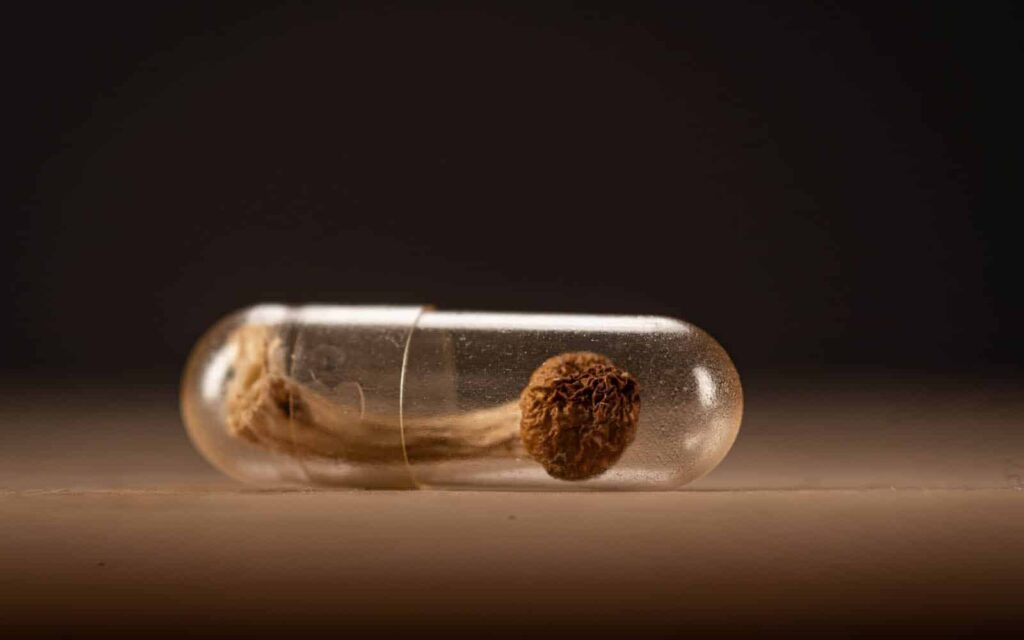
Understanding Psilocybin Microdosing
Defining Psilocybin Microdosing: Balance for Maximum Benefits
Psilocybin microdosing is a practice that involves taking very small amounts of psychedelic mushrooms to harness their physiological effects while minimizing unwanted side effects. A microdose is typically defined as 5-10% of a usual psychoactive dose, with an estimated range of 0.1 to 0.3 grams of dried magic mushrooms for psilocybin.
One challenge you may encounter in determining the correct microdose for psilocybin is the variability in the potency of mushrooms. It is recommend that if you’re trying microdosing for the first time, to experiment when you have no responsibilities or commitments. There is a fine line between microdosing and slightly tripping on a Tuesday morning! Play it safe until you’re sure you’ve accurately measured the amount of psilocybin that will work for you to feel balanced. Despite this challenge, microdosing has gained popularity as a means to unlock creativity, enhance well-being, and improve emotional resilience, all while maintaining normal daily functioning.
A Brief History: From Ancient Roots to Modern Revival
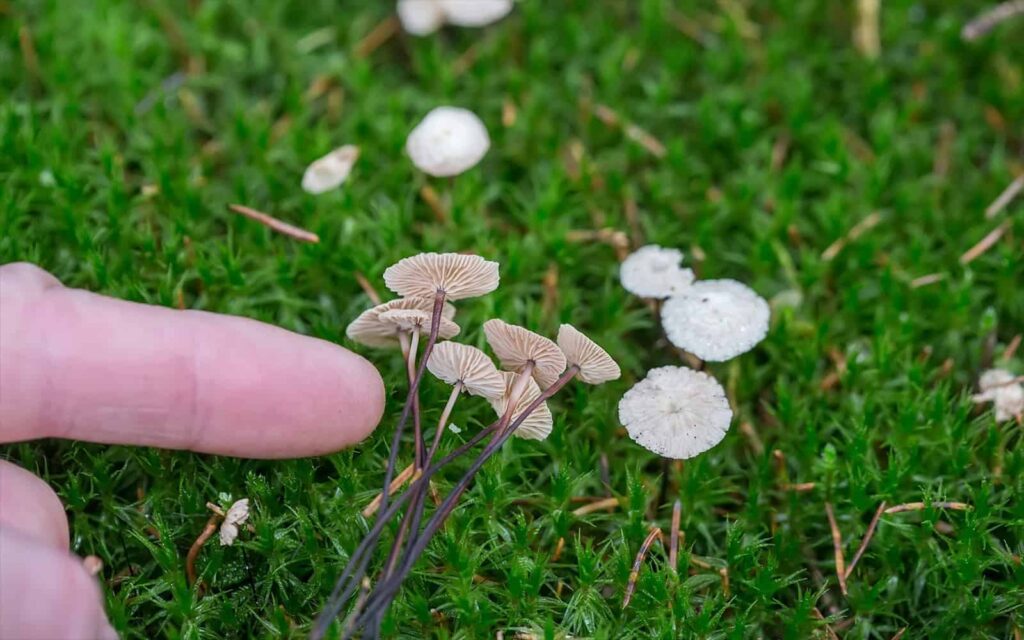
The modern day concept of microdosing likely began with the inventor of LSD, Albert Hoffman. This Swiss chemist, who first created the compound, revealed in his later years that he frequently consumed sub-threshold doses to enrich his walks in nature. He even suggested LSD microdoses as a healthier substitute for attention-deficit medications such as Ritalin.
In 1966, psychologist James Fadiman devised an official scientific method for documenting microdosing experiences and shared it with interested individuals nationwide. Unfortunately, his timing was far from ideal, as psychoactive substances had just been classified as Schedule-I illegal in the United States. While Timothy Leary continued to use massive, now-illegal doses of LSD, Fadiman pursued a more discreet approach, steadily amassing accounts from an expanding microdosing community.
Over four decades, Fadiman meticulously maintained and organized every microdosing account he acquired. He received letters from hundreds of individuals who detailed their experiences with microdosing various psychoactive compounds—including LSD, cannabis, psilocybin, and even DMT. Across all these narratives, microdosers reported remarkably consistent outcomes: heightened concentration, creativity, optimism, and a soothingly tranquil state of alertness.
While the legality of psychedelic substances varies from country to country, interest in psychedelic microdosing benefits has continued to grow. Psilocybin microdosing allows individuals to work, socialize, and function normally while experiencing enhanced mental and emotional well-being.
The duration of a microdosing regimen varies depending on individual needs and preferences. Some people may find a month of microdosing to be sufficient, while others may continue for several months. The key is to listen to your body and intuition, as psychedelics are not prescriptive and should not follow a one-size-fits-all approach.
The Science Behind Microdosing Psilocybin
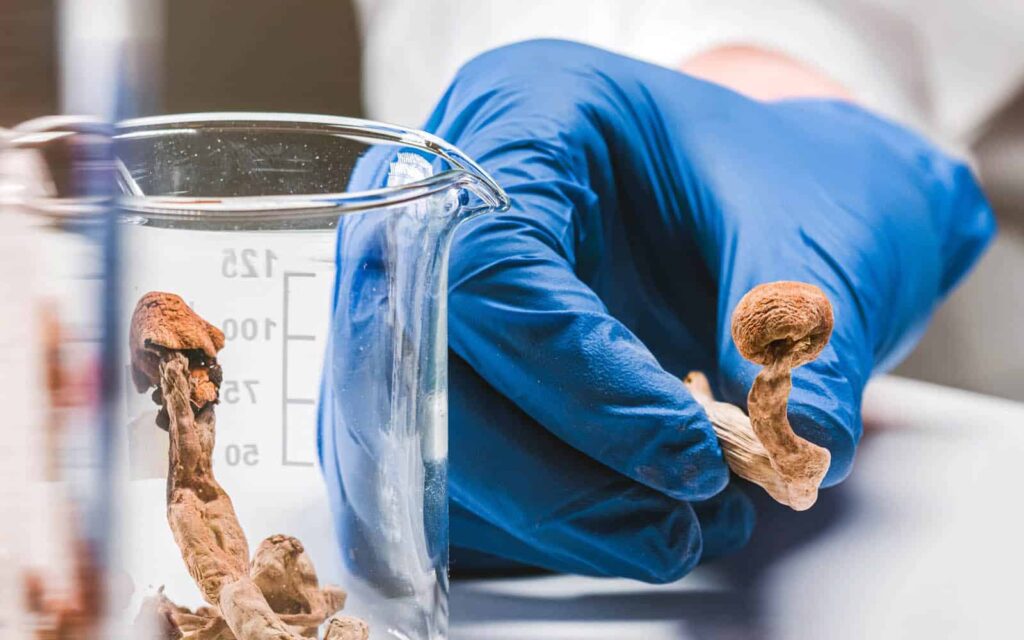
The 5-HT2A Receptor: Unlocking the Science Behind Psilocybin Microdosing
Imagine a world where a single dose of a natural substance can help improve your mood and emotional well-being. Recent research on psilocybin has shown promising results in understanding the antidepressant effects of this incredible substance. At the heart of this discovery lies a receptor in our brain called the serotonin 2A receptor (5-HT2AR).
When psilocybin enters our body, it interacts with the 5-HT2AR and other receptors, potentially increasing the density of a protein called synaptic vesicle protein 2A (SV2A) and reducing the density of 5-HT2AR in our brain. This process might play a crucial role in the antidepressant effects of psilocybin.
Researchers studied pigs that were given a single dose of psilocybin and found that after just one day, there was a significant increase in SV2A in the hippocampus (a brain region associated with emotional processing) and a decrease in 5-HT2AR density. These effects continued to be observed seven days after psilocybin administration.
This fascinating research opens the door to a new understanding of how psilocybin microdosing can potentially help with mood disorders and overall emotional well-being. Although the science may seem complex, the outcome is simple: psilocybin could be a powerful ally in our journey towards emotional balance and happiness.
The Default Mode Network: A Key to Understanding the Power of psychedelic drugs
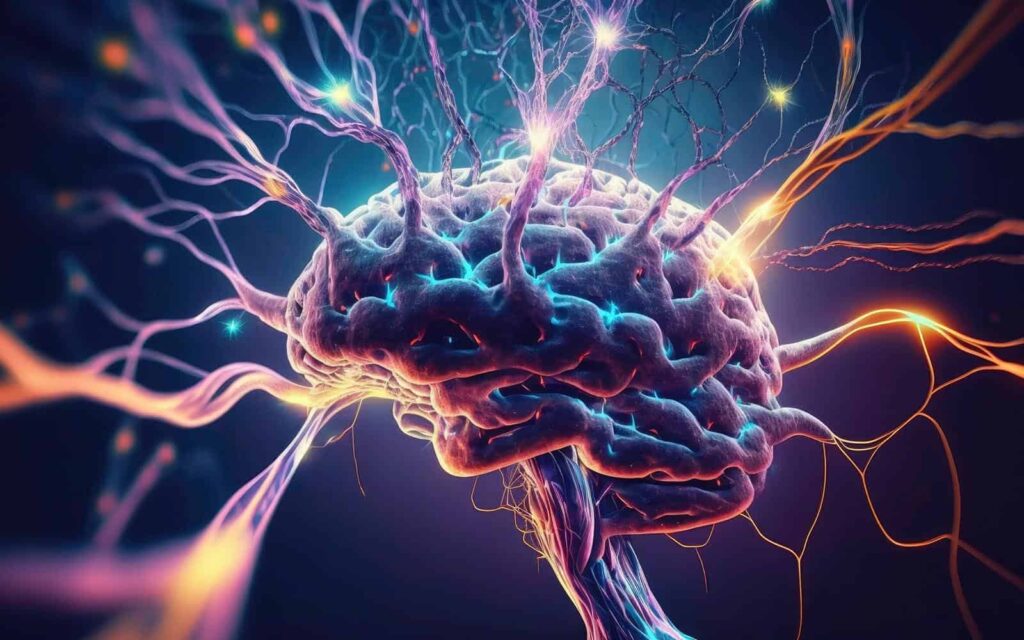
Imagine the brain as a bustling city, with countless thoughts and emotions constantly flowing through it. At the heart of this city lies the Default Mode Network (DMN), a group of brain regions that is active when we focus on our internal thoughts, memories, challenging experiences, and emotions. It’s like the city’s downtown, where much of our mental energy converges.
However, sometimes the DMN can become overactive, leading to various mental health issues like depression, anxiety, and PTSD. This is where psychedelic drugs such as psilocybin, LSD, and ayahuasca, come into play. These powerful substances have the potential to “disrupt” the DMN, allowing for greater mental flexibility and emotional healing.
Recent studies have revealed fascinating insights into how psychedelics affect brain waves in the DMN. For instance, among the 17 psilocybin studies included in a comprehensive review, the average participant age was 34.6 years, with an average of 26 participants per study. Most of these studies used functional MRI (fMRI) and some used electroencephalogram (EEG) or magnetoencephalogram (MEG) to measure brain activity. The findings consistently showed that psilocybin significantly reduced DMN connectivity.
Similar results were found for ayahuasca and LSD, with all studies showing a decrease in DMN activity after administration. These findings suggest that the therapeutic potential of these substances may be closely linked to their ability to modulate the DMN.
In summary, the DMN is like the “control center” of our emotional well-being, and psychedelics have the power to “reset” this center, allowing for profound healing and personal growth. By understanding the science behind these substances and their effects on the DMN, we can harness their potential to unlock new possibilities for mental health treatments and self-discovery.
The Remarkable Benefits of Microdosing Psychedelics for Your Mental Health
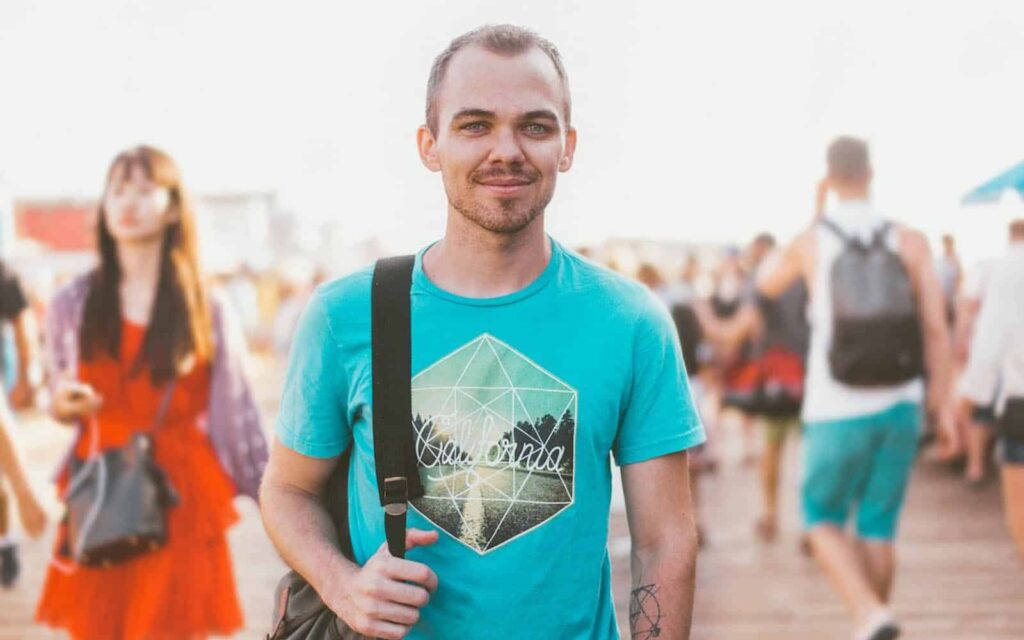
The practice of microdosing psychedelics, such as psilocybin and LSD, has captured the interest of many for its potential to enhance various aspects of life, from mental health and focus to emotional well-being and interpersonal relationships. As scientific research continues to evolve, a growing body of reports and observational studies highlights a wide range of potential benefits associated with microdosing:
-
Heightened Resilience: Microdosing has been reported to increase an individual’s ability to cope with stress and adapt to changing situations, resulting in improved emotional resilience and overall mental health.
-
Enhanced Cognitive Flexibility: Some users of microdosing have noted that psilocybin can promote cognitive flexibility, allowing them to approach problems from various perspectives and adapt their thinking to new information.
-
Improved Sleep Quality: Some individuals have experienced better sleep quality and more restorative rest when microdosing, which can contribute to enhanced overall well-being.
-
Strengthened Spiritual Connection: Many people report a deepened sense of spirituality and connection to the world around them while microdosing, fostering a greater appreciation for life and the interconnectedness of all things.
-
Accelerated Personal Growth: Microdosing can facilitate self-reflection and introspection, enabling individuals to confront their fears, break through personal barriers, and achieve personal growth at an accelerated pace.
-
Increased Motivation and Productivity: Reports suggest that microdosing can boost motivation and productivity levels, helping individuals with mental concentration to stay focused and complete tasks more efficiently.
-
Balanced Mood and Emotional Regulation: Some users find that microdosing helps to stabilize mood swings and promote a more balanced emotional state, leading to increased emotional intelligence and healthier relationships.
-
Heightened Sensory Perception: Some individuals have reported enhanced sensory perception while microdosing, which may contribute to a more profound appreciation for art, music, and nature.
-
Easing of Chronic Pain: Although more research is needed, there are accounts of individuals experiencing relief from chronic pain conditions such as migraines and fibromyalgia while microdosing.
-
Promotion of Neuroplasticity: Emerging research suggests that microdosing psychedelics may promote neuroplasticity—the brain’s ability to form new connections and adapt to new experiences—potentially leading to long-term cognitive and emotional improvements.
While more long-term studies and clinical trials are needed to fully understand the benefits and risks of microdosing, early research show promise for psychedelic drug and its potential to improve various aspects of daily life. As research continues to explore the impact of microdosing on mental health, productivity, and personal growth, we may soon unlock the full potential of these remarkable substances.
Popular Microdosing Regimens
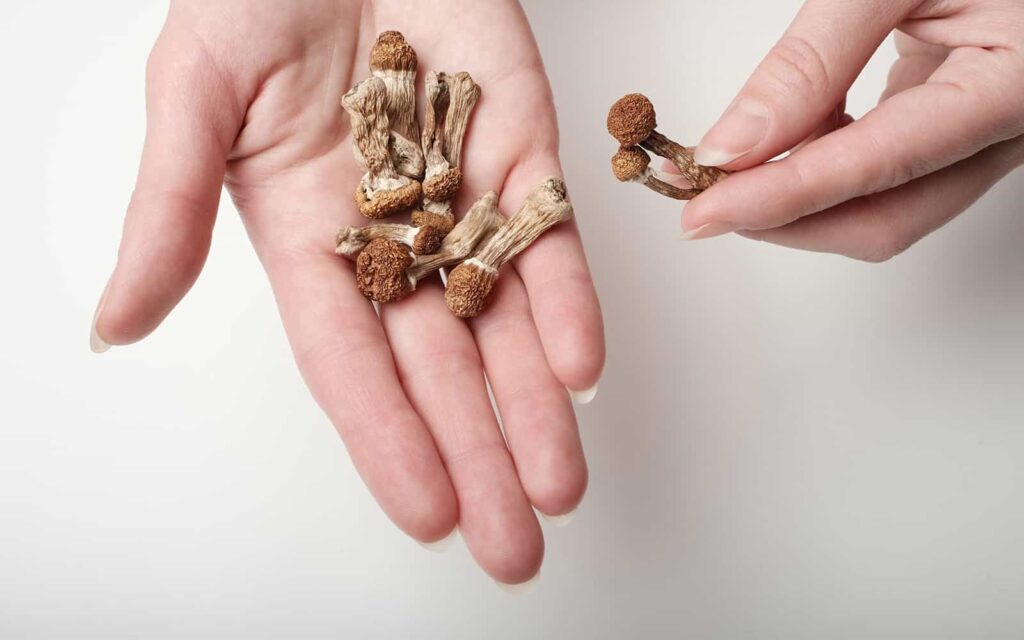
When it comes to microdosing psilocybin mushrooms, there are several popular regimens you can follow. Each has its unique approach and structure, with varying numbers of off days to prevent building tolerance. It is important to be in tune with and to listen to your body’s needs. Here are three widely accepted and recognized protocols:
The Fadiman Protocol
Created by Dr. James Fadiman, this regimen is popular among the psychonaut community. It follows a 3-day cycle:
Day 1: First microdose
Day 2: Transition day (no dose, residual effects may be sensed)
Day 3: Normal day (no dose)
Repeat this cycle for 4-8 weeks or indefinitely, taking a 2-4 week break if tolerance builds up.
The Stamets Stack
Developed by mycologist Paul Stamets, this protocol involves “stacking” several supplements to create a nootropic stack. The ingredients include:
-
0.1 grams of Psilocybe cubensis mushroom
-
5-20 grams of whole or powdered Lion’s Mane OR 50-200mg of Lion’s Mane extract
-
75-200 mg of Niacin (Vitamin B3)
The microdosing schedule for the Stamets Stack is as follows:
-
Days 1-4: Microdosing days
-
Days 5-7: Transition days
-
Days 8-11: Microdosing days
-
Days 12-14: Transition days
Lion’s Mane is believed to promote neurogenesis and stimulate nerve growth, while Niacin helps deliver the compounds to neurons and the brain blood barrier.
Intuitive Microdosing
After experimenting with the Fadiman Protocol or Stamets Stack, some people switch to a more intuitive microdosing routine. This method allows you to microdose whenever you feel it’s necessary, based on your individual needs and circumstances. However, it’s crucial to maintain at least one day between microdoses or reserve two consecutive days per week to prevent building up a tolerance.
These popular regimens offer different approaches to microdosing, allowing you to find the one that best suits your needs and preferences. Always prioritize safety and consult with a healthcare professional before starting any new practice.
Microdosing Psilocybin for Therapeutic Use
Microdosing psychedelic mushrooms has gained attention as a potential therapeutic tool for various mental health conditions and addiction recovery. While research is still ongoing, preliminary studies suggest that microdosing may offer benefits in the following areas:
-
Depression and Anxiety: Numerous microdosers have reported improvements in mood, reduced anxiety, and better emotional stability. Some individuals find microdosing to be more effective than traditional antidepressants and anxiety medications, with research recently backing up that claim. In addition, microdosing in conjunction with therapy may facilitate access to previously difficult issues and promote creative insights into personal experiences and relationships.
-
PTSD: People struggling with post-traumatic stress disorder (PTSD) may find relief through microdosing mushrooms. Evidence suggests that a regular microdosing regimen can help alleviate symptoms of PTSD, such as flashbacks, nightmares, and emotional numbness.
-
Addiction Recovery: Psilocybin microdosing has been reported to aid in the recovery process for various substance use disorders, including alcoholism, nicotine dependence, and opioid use disorder. It is thought to promote neural adaptability and help individuals reframe maladaptive habits and behaviors associated with addiction.
Preliminary research, including qualitative and survey data, has shown promising results in improving mental health through microdosing. For example, in a large international survey, nearly half of the participants who were previously prescribed medications stopped taking antidepressants after microdosing.
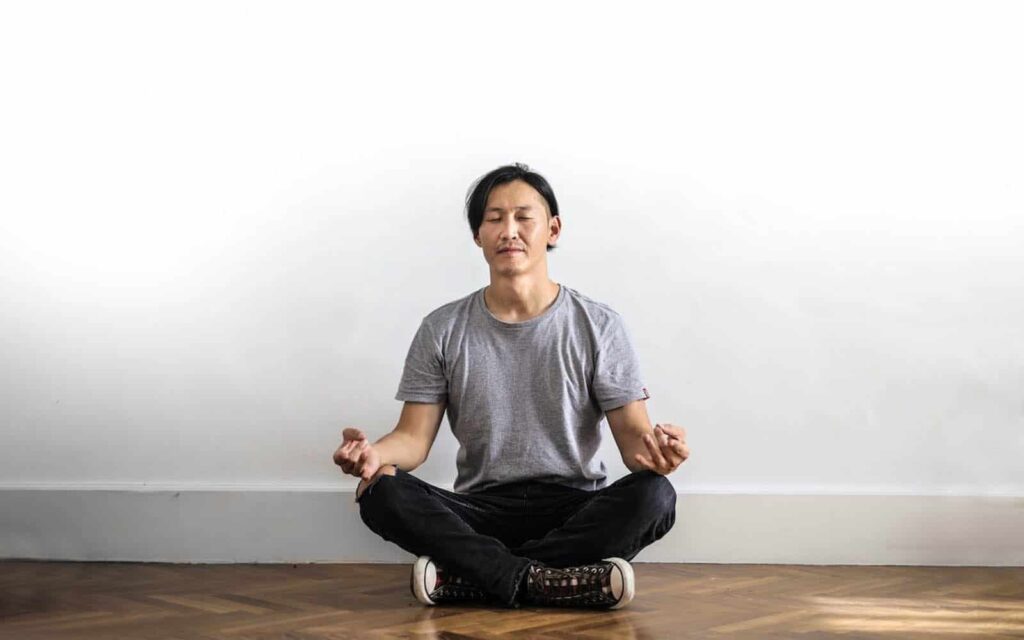
Legality of Psilocybin Mushrooms
Before venturing into the world of microdosing, it is crucial to familiarize yourself with the legal status of psilocybin mushrooms in your country or region. While psilocybin mushrooms remain illegal in many parts of the world, an increasing number of locations are decriminalizing or even legalizing them for therapeutic purposes.
-
Cultivating Psilocybin Mushrooms: In some regions, cultivating psilocybin mushrooms for personal use is permitted. If you live in such an area, you may consider growing your own mushrooms to ensure a consistent, reliable, and safe supply for your microdosing journey. Numerous resources and kits are available to help guide you through the cultivation process.
-
Alternative Options in Europe: For those residing in Europe, psilocybin truffles offer a legal alternative in the Netherlands. It is important to note that truffles are less potent than psilocybin mushrooms, so adjust your dosage accordingly. A starting dose of 0.5g of dried truffle powder is recommended for microdosing.
-
Decriminalization and Legalization in the United States: In the US, several cities and states have taken steps towards decriminalizing psilocybin or legalizing it for therapeutic and medical purposes. As a result, access to psilocybin for microdosing may become more feasible in the coming years.
-
Navigating Legal Grey Areas: In some locations, the legality of psilocybin mushrooms remains a grey area. For example, while it may be illegal to possess and sell mushrooms, the spores used for cultivation could be legal to purchase. Be sure to thoroughly research the legal nuances in your region to ensure compliance.
-
Consulting with Professionals: When considering microdosing, it may be beneficial to consult with a healthcare professional or therapist who is knowledgeable about the practice. In some cases, they may be able to provide guidance, resources, and support to help you navigate the legal landscape and ensure a safe and effective experience.
-
Staying Informed: As the legal status of psilocybin mushrooms continues to evolve around the world, it is essential to stay informed about changes in legislation and public opinion. By doing so, you can better understand the opportunities and challenges surrounding microdosing and advocate for responsible, evidence-based policies.
In conclusion, always exercise caution and due diligence when exploring the realm of microdosing. Ensure that you understand and adhere to local laws and regulations, and seek professional guidance when necessary. By doing so, you can safely and responsibly embark on your microdosing journey while staying within the bounds of the law.
Preparing for Your Psilocybin Microdosing Journey
To embark on a successful psilocybin microdosing journey, consider the following steps:
Sourcing Psilocybin Mushrooms
Ensure that you have a reliable and legal source of psilocybin mushrooms. Be aware of local laws and consider growing your own psilocybe mushrooms if it’s legal in your area.
Accurate Dosing
A typical microdose of psilocybin mushrooms is around 200 mg (0.2 grams). This dose may vary depending on factors like the potency of the mushrooms and individual body weight. Start with a low dose and adjust as needed.
Here are the typical microdoses for various substances:
-
Magic mushrooms — 200 mg (0.2 grams)
-
LSD — 8–12 micrograms
-
MDMA — 5–10 mg
-
Mescaline — 10–40 mg
-
Marijuana — 2.5–5 mg THC
Establishing Intentions and Goals
Setting intentions and goals before starting your microdosing journey can make a significant impact on your overall experience. Reflect on your motivations and what you hope to gain from microdosing, such as improved focus, creativity, or personal growth.
Timing Your Microdose
Most people take their microdose in the morning to prevent interference with sleep. Consider when you want the effects to peak in relation to your daily activities and goals. Avoid taking a microdose less than eight hours before bedtime to minimize sleep disruptions.
Duration of Microdosing
Microdosing is most effective when done consistently over several weeks or months. Many people microdose for 6 to 8 weeks followed by a break of a month or two. This approach allows for gradual, long-term improvements while giving your body and mind time to rest and integrate the experience.
Remember that every individual’s microdosing journey is unique. Be open to adjusting your dose, schedule, and goals as needed to optimize your experience and personal growth.
Journey Beyond the Trip: Psychedelic Integration
Psychedelic integration is a crucial process that helps individuals incorporate insights, emotions, and attitudes from their psychedelic experiences into their daily lives. This process aims to achieve a sense of “wholeness” by addressing intentions such as taking responsibility for mistakes, speaking one’s truth, or reconnecting with neglected parts of oneself.
Psychedelic experiences can dramatically change one’s perspective on themselves, others, and their goals. Integration is the process that brings these insights into reality. For example, if an individual realizes the importance of self-care during their experience, the integration process would involve putting that into practice by adjusting their sleep schedule, exercising more, or changing their diet.
Integration processes vary significantly among individuals, as each person’s experience and intentions are unique. The activities involved in integration can range from simple tasks like calling a loved one to more complex, ongoing endeavors like speaking one’s authentic truth consistently.
There are three common categories of psychedelic integration:
-
Physical or somatic integration
-
Psycho-spiritual integration
-
Emotional integration
Physical integration focuses on bodily sensations and feelings, while psycho-spiritual integration deals with one’s perception of themselves, others, and the world. Emotional integration involves processing emotions and feelings that emerge in life, including grief, forgiveness, and gratitude.
The duration of psychedelic integration varies depending on the person, their intentions, and the insights gained from the experience. Some actions can be carried out quickly, while others may take weeks, months, or even years. Integration can also be a lifelong process, as individuals and their environments continuously evolve.
Psychedelic integration is vital because it turns the potential insights from the experience into tangible changes in one’s life. Without proper integration, the lasting impact of psychedelic therapy may not be fully realized, making integration an essential component of the psychedelic journey.
Conclusion
In conclusion, the practice of microdosing psilocybin presents a promising avenue for those seeking to enhance mental health, creativity, focus, and emotional well-being. As research continues to shed light on the science behind the effects of psychedelics on the brain, including their interactions with receptors and neural networks, we uncover new ways to harness their transformative potential. The therapeutic applications of microdosing are becoming increasingly evident, with evidence suggesting its efficacy in treating various mental health conditions and aiding in addiction recovery.
Navigating the legal landscape of psilocybin can be challenging; however, it is essential to remain informed and abide by local laws and regulations. When embarking on your microdosing journey, prioritizing the setting of intentions, accurate dosing, and tailoring your regimen to your individual needs and goals will significantly impact your experience. By embracing the ancient wisdom surrounding psychedelics, and coupling it with contemporary psychedelic research itself, we can unlock the full potential of these powerful substances and improve multiple aspects of our daily lives.
Microdosing psilocybin can be a valuable tool for anyone seeking personal growth, self-discovery, and enhanced productivity. As more cities and countries consider decriminalizing or legalizing psilocybin for therapeutic use, public interest in microdosing is likely to grow. This expansion of accessibility may further contribute to the destigmatization of psychedelics, paving the way for their integration into mainstream mental health and wellness practices.
For customers interested in pursuing psilocybin microdosing, it is crucial to emphasize the importance of thorough research and responsible drug use. By following a consistent regimen and remaining open to adjusting the dose, schedule, and goals, individuals can optimize their experience and personal growth. Ultimately, the journey of psilocybin microdosing offers a pathway to a more balanced and fulfilling life, enabling seekers to explore the depths of their minds and unlock their full potential.
Finally, psychedelic integration is a critical and transformative process that allows individuals to harness the full potential of their psychedelic experiences. By turning insights into tangible actions and personal growth, integration leads to lasting change and fosters a deeper understanding of oneself and the world. Embracing the various aspects of integration—physical, psycho-spiritual, and emotional—enables individuals to create meaningful and sustainable improvements in their lives. It’s essential to recognize that the journey doesn’t end with the psychedelic experience; it’s merely the beginning of a lifelong path towards growth, self-discovery, and wholeness.
Frequently asked questions
Psilocybin microdosing involves the consumption of small, sub-perceptual doses of psilocybin mushrooms, which typically do not cause intense psychedelic effects. Instead, these doses may provide subtle benefits such as enhanced focus, creativity, mood improvement, and increased self-awareness, among others.
The legality of microdosing or ingesting psilocybin mushrooms varies greatly depending on your location. It is essential to research and understand the local laws and regulations surrounding psilocybin mushrooms before considering microdosing. In some areas, possession and cultivation of psilocybin mushrooms are illegal, while other regions have decriminalized or are moving toward legalization for therapeutic purposes.
A standard psilocybin microdose is generally around 200 mg (0.2 grams). However, this amount may need to be adjusted based on factors such as the potency of the mushrooms and individual body weight or sensitivity. It is always best to start with a lower dose and gradually increase it to find the optimal dosage for your unique needs.
Microdosing is generally considered safe when practiced responsibly. It is essential to start with a low dose, follow a structured microdosing schedule, and consult a healthcare professional if you have any pre-existing mental health conditions or concerns. Keep in mind that microdosing is not suitable for everyone and may exacerbate certain mental health issues in some individuals.
Many individuals have found that combining microdosing with therapy can enhance self-insight, making it easier to address difficult topics and explore personal experiences in a more profound way. It is important to discuss this option with your therapist or mental health professional to determine if it is appropriate for your unique circumstances.
A typical microdosing regimen often lasts for 6-8 weeks, followed by a break of a month or two. This break allows time for self-assessment, determining the effectiveness of the microdosing regimen, and deciding whether to continue or adjust your approach.
To accurately measure your psilocybin microdose, it is crucial to use a precise digital scale capable of measuring small amounts. Grinding the mushrooms into a fine powder can also help ensure a more consistent dosing experience, as it allows for more even distribution of the active compounds.




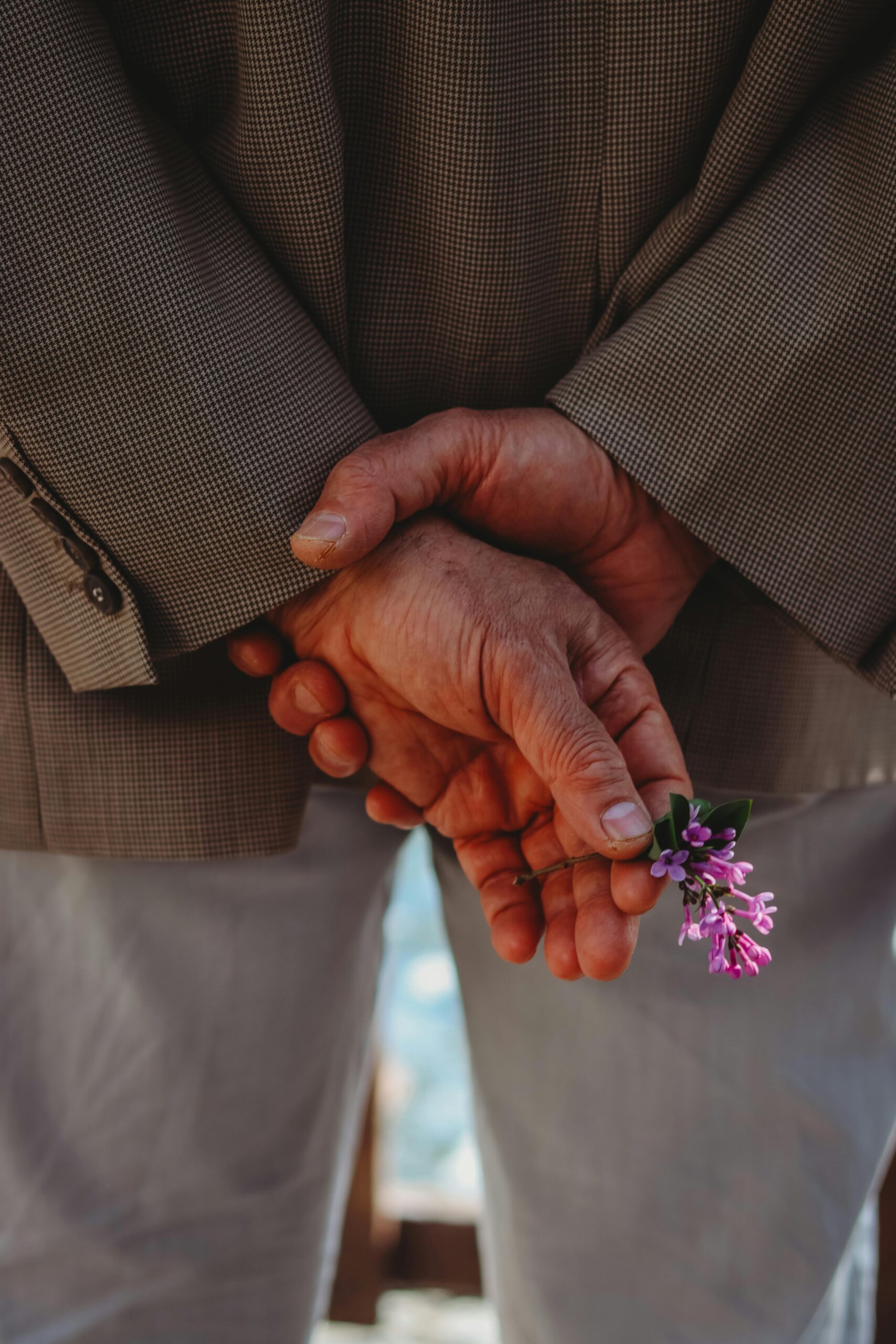
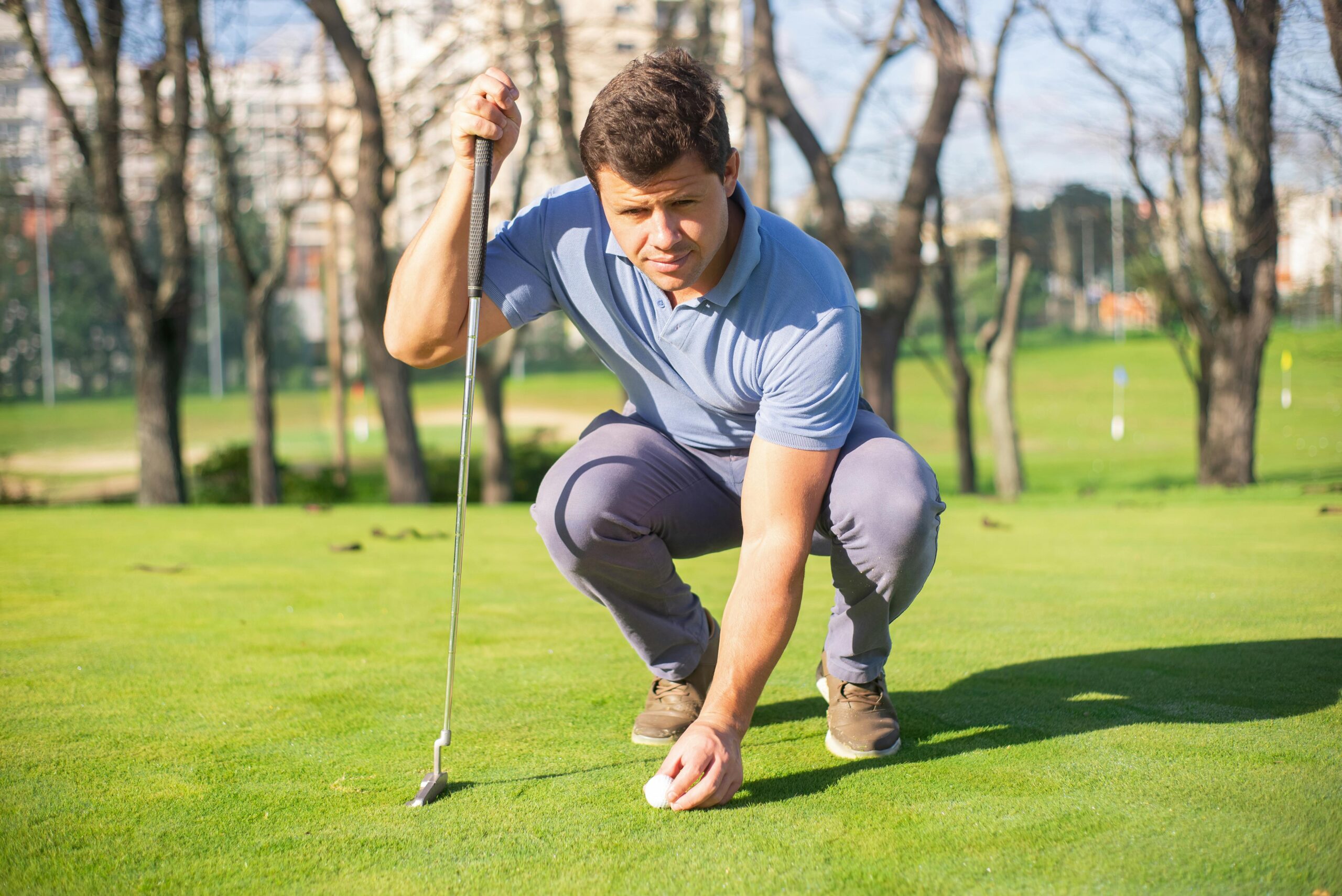




 Daytryp Health has taken
Daytryp Health has taken  The
The